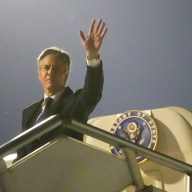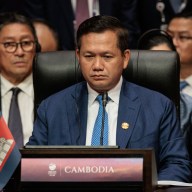Jeremy Irons has two films out in the States that arrive around the same time. New to theaters is the biopic “The Man Who Knew Infinity,” about the inexplicably obscure Indian mathematician Srinivasan Ramanujan (played by Dev Patel). Mid-May brings “High-Rise,” based on J.G. Ballard’s classic novel. The first is about prejudice; the other is about societal collapse. Irons loves talking about both. In “Infinity” the Oscar-winner plays a math legend who’s one of the only people not prejudiced against Ramanujan, whose findings contributed mightily to science.
RELATED: Interview: Treat Williams on “The Congressman” and helping a politician make his first movie “There are people who are instinctively frightened of people who are different from them. That comes out of prejudice — and, I think, from insecurity and fear,” Irons tells us in his soothing yet coarse English timbre. “The great thing about being an actor is I’m so used to being inside other people. I hope I’m not prejudiced. I mean, I get cross with some people for their narrow-mindedness or their lack of care or their apathy. But that has nothing to do with their race, religion or color.” “Infinity”’s real-life story is set over a century ago, but it has obvious resonations with today when the political theater has been reactivating deep-seated prejudices, both here and in Irons’ native England. Part of the reason, he thinks, is the failure of our leaders. RELATED: Interview: Aasif Mandvi on “Mother’s Day,” Trump and being a “brown actor” in Hollywood “All over the world people are losing faith in their politicians,” Irons surmises. “They’re running our countries on purely economic rather than idealistic terms. I think that’s a mistake. Politicians should have the strength to say, ‘What kind of country, what kind of world do we want? Let’s make our economy create that for us, rather than just following the dollar or the pound.’” Irons rattles off a laundry list of societal ills that aren’t being addressed. He floats the idea, currently being considered in Finland, of paying everyone a wage whether they’re employed or not. “We’ve always said that computers or robots or whatever will do the work. And that’s beginning to happen. But that means there’s no work and no money. And it’s the big corporations who earn that huge amount of money. That has to come down,” he says. “We have got to start thinking in those terms.” Irons predicts another economic collapse, bigger than the one in 2008 because we still have unregulated markets. He also challenges the notion — ingrained in the West since after World War II — that buying things makes us happy. “We’ve been told to believe that people will consume and it will keep the economy going. Well, we don’t need all that stuff. We need to consume better stuff,” Irons says, before launching into how the food we eat is “rubbish,” filled with chemicals prone to poison us or make us fat, thus driving up health bills. RELATED: Interview: No, Christopher Walken isn’t that scary in real life It’s here that what started as a conversation about “Infinity” and bigotry turns into a discussion more in line with “High-Rise,” in which Ballard created a dirty, violent, darkly hilarious allegory about an apartment building whose inhabitants turn to tribalism and feral instincts and violence. Ballard was writing in 1975, but his book — and the new film, in which Irons plays the building’s wealthy architect, who lives in swank digs on the top floor as the masses revolt below — feels like it predicted a future that may or may not finally happen. “You have a huge underclass in Europe and America who have nothing to lose. And that’s when revolutions start. We can’t allow that to happen,” Irons says. “That’s why when Trump stands up and starts spouting what I call ‘bar-room politics,’ they’re very attractive. The man on the street says, ‘Yeah, let’s make America great again!’ What the f— does that mean?” RELATED:Interview: Riley Keough talks “The Girlfriend Experience” and if we make too big a deal out of sex Irons points out that’s happening in England as well. They have their Bernie Sanders: Jeremy Corbyn, who, he says, “really believes in his ideology but is, sadly, maybe not a political animal in quite the way that makes a leader.” And they have Nigel Farage, an “idiot,” Irons says, “who is a bit like Trump, who spouts off in fairly un-thought-out ways about things that are wrong — which is easy to do if you’re not in the driving seat and you have to get it right.” As such, some in England find Farage very attractive. But there’s one big difference between America and England. Irons adds, wryly: “The English have a nose for charlatans.”
Follow Matt Prigge on Twitter @mattprigge


















